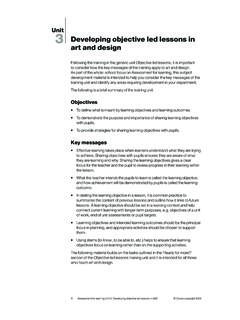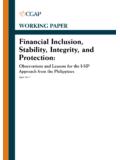Transcription of PROMOTING SMEs FOR DEVELOPMENT - OECD
1 2nd OECD CONFERENCE OF MINISTERS RESPONSIBLE FOR SMALL AND MEDIUM-SIZED ENTERPRISES ( smes ) PROMOTING ENTREPRENEURSHIP AND INNOVATIVE smes IN A GLOBAL ECONOMY: TOWARDS A MORE RESPONSIBLE AND INCLUSIVE GLOBALISATION Istanbul, Turkey 3-5 June 2004 PROMOTING smes FOR DEVELOPMENT ORGANISATION FOR ECONOMIC CO-OPERATION AND DEVELOPMENT ORGANISATION FOR ECONOMIC CO-OPERATION AND DEVELOPMENT Pursuant to Article 1 of the Convention signed in Paris on 14th December 1960, and which came into force on 30th September 1961, the Organisation for Economic Co-operation and DEVELOPMENT (OECD) shall promote policies designed: To achieve the highest sustainable economic growth and employment and a rising standard of living in member countries, while maintaining financial stability, and thus to contribute to the DEVELOPMENT of the world economy.
2 To contribute to sound economic expansion in member as well as non-member countries in the process of economic DEVELOPMENT ; and To contribute to the expansion of world trade on a multilateral, non-discriminatory basis in accordance with international obligations. The original member countries of the OECD are Austria, Belgium, Canada, Denmark, France, Germany, Greece, Iceland, Ireland, Italy, Luxembourg, the Netherlands, Norway, Portugal, Spain, Sweden, Switzerland, Turkey, the United Kingdom and the United States. The following countries became members subsequently through accession at the dates indicated hereafter: Japan (28th April 1964), Finland (28th January 1969), Australia (7th June 1971), New Zealand (29th May 1973), Mexico (18th May 1994), the Czech Republic (21st December 1995), Hungary (7th May 1996), Poland (22nd November 1996), Korea (12th December 1996) and the Slovak Republic (14th December 2000).
3 The Commission of the European Communities takes part in the work of the OECD (Article 13 of the OECD Convention). OECD 2004. Applications for permission to reproduce or translate all or part of this material should be made to: OECD Publications, 2 rue Andr -Pascal, 75775 Paris Cedex 16, France. 2 FOREWORD At the first OECD Conference of Ministers responsible for smes , hosted by the Italian government in Bologna, Italy, in June 2000, Ministers from nearly 50 member and non-member economies adopted the Bologna Charter for SME Policies . They envisaged the Bologna Conference as the start of a policy dialogue among OECD Member countries and non-Member economies and that it would be followed up by a continuous monitoring of progress with the implementation of the Bologna Charter. This dialogue and monitoring have become known as the OECD Bologna Process.
4 The second OECD Conference of Ministers Responsible for smes , hosted by the Turkish Ministry for Industry and Trade, envisaged by Ministers at Bologna, provides an occasion to assess the impact on smes of new developments relating to globalisation. This report is one of ten background reports prepared for the Istanbul Ministerial Conference, the theme of each of the ten reports being linked to a specific Workshop of the Ministerial Conference. This report is the main background documentation for Workshop 4: Enhancing the Role of smes for DEVELOPMENT . An earlier version of the report was reviewed by the Working Party on smes and Entrepreneurship whose comments have been incorporated into the final version. Non member economies participating in the OECD Bologna Process have also had an opportunity to provide comments on an earlier version.
5 This final report also sets out some policy messages and recommendations that have emerged from the preparatory work undertaken in the OECD Working Party for smes and Entrepreneurship. The wide variation in stages of economic DEVELOPMENT , institutional arrangements and political context across the economies participating in the Bologna Process, now more than 80, means that not all parts of specific policies and programmes are appropriate for all participants. The messages and recommendations outlined below provide material from which governments may choose to draw in PROMOTING innovative smes in the global economy. In broad terms, these policy messages and recommendations elaborate on the themes developed in the Bologna Charter.
6 Ministers will consider these and other recommendations in their deliberations at the Istanbul Conference. The report was prepared by the OECD Secretariat the DEVELOPMENT Co-operation Directorate, the DEVELOPMENT Centre and the Directorate for Financial and Enterprise Affairs, in cooperation with the SME Unit of the Directorate for Science, Technology and Industry and with the contribution of Ms. Nilgun Tas, External Consultant to the OECD. This report is published on the responsibility of the Secretary-General of the OECD. Views expressed are those of the authors and do not necessarily reflect those of the Organisation or its member governments. This and other background documents prepared for the 2nd OECD Conference of Ministers Responsible for smes may be downloaded free of charge from the following websites: SME Unit website: Conference website: 3 TABLE OF CONTENTS EXECUTIVE Characteristics and Importance of Strengthening SME Competitiveness in Transition and Developing Building up Trade and Investment Capacity of smes .
7 36 Improving Aid ANNEX I. INSTITUTIONAL SUPPORT STRUCTURES FOR 4 PROMOTING smes for DEVELOPMENT : The Enabling Environment and Trade and Investment Capacity Building EXECUTIVE SUMMARY Recent assessments of growth point to an understanding that the rate at which countries grow is substantially determined by 1) their ability to integrate with the global economy through trade and investment; 2) their capacity to maintain sustainable government finances and sound money; and 3) their ability to put in place an institutional environment in which contracts can be enforced and property rights can be established. As globalization proceeds, transition and developing countries and their enterprises face major challenges for strengthening their human and institutional capacities to take advantage of trade and investment opportunities.
8 While governments make policies in trade and investment areas, it is enterprises that trade and invest. Therefore, supply-side bottlenecks in the trade and investment areas and how governments, DEVELOPMENT partners and the private sector itself address these constraints have direct implications on the economic growth potential of transition and developing countries. smes play a key role in transition and developing countries. These firms typically account for more than 90% of all firms outside the agricultural sector, constitute a major source of employment and generate significant domestic and export earnings. As such, SME DEVELOPMENT emerges as a key instrument in poverty reduction efforts. Globalization and trade liberalization have ushered in new opportunities as well as challenges for smes .
9 Presently, only a small part of the SME sector is able to identify and exploit these opportunities and deal with the challenges. The majority of smes in developing and transition countries, however, has been less able or unable to exploit the benefits of globalization and, to add to the situation, are frequently under pressure on the local or domestic markets from cheaper imports and foreign competition. A major objective of work to promote the DEVELOPMENT of the SME sector is therefore to change the balance between these two groups of smes and to equip smes to better meet the challenges of globalization and to benefit from its opportunities. smes , due to their size, are particularly constrained by non-competitive real exchange rates, limited access to finance, cumbersome bureaucratic procedures in setting up, operating and growing a business, poor state of infrastructure and lack of effective institutional structures.
10 The removal of these constraints is a daunting task calling for holistic SME support, an enabling environment for SME DEVELOPMENT consisting of functioning macro, meso and micro level institutions. Basic Lessons Learned in SME DEVELOPMENT On the basis of analysis to date, the following lessons seem to hold true, independent of region and level of DEVELOPMENT among countries: SME DEVELOPMENT requires a crosscutting strategy that touches upon many areas ( ability of governments to implement sound macroeconomic policies, capability of stakeholders to develop conducive microeconomic business environments, inter alia, through simplified legal and regulatory frameworks, good governance, abundant and accessible finance, suitable 5 infrastructure, supportive education, sufficiently healthy and flexibly skilled labour as well as capable public and private institutions, and the ability of smes to implement competitive operating practices and business strategies).
















